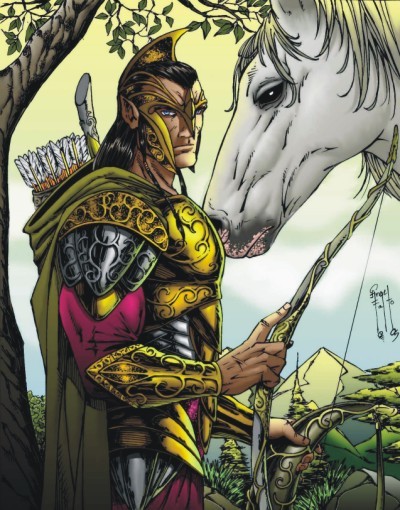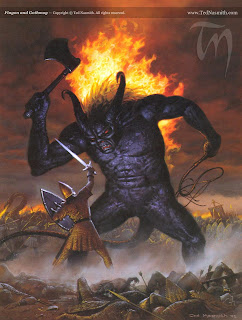I like seeing "thee" and "thou", "thy" and "thine" being used in these olden days. Understandably, flaws and errors in their use are common because few of us (none of us?) learned these words as any part of a spoken, living language.
One using language incorrectly appears pretentious or unschooled. That might be wholly in character. Thus, best it is that others do react in their own character. The educated will, with varying degrees of indulgence, compassion and skill, wish to correct bad grammar and usage, but they might appear snooty, pedantic, or parental in doing so.
Therefore, taking the risk of appearing EXTREMELY snooty, pedantic and parental, I shall set the example. While there are many books and grammars that give hows and wherefores, they often demand a grasp of grammar that most (mono-lingual Americans) simply do not have. Instead, we start start with:
YE* CHART
speaker:
I am mine, as me, my thing, mine end.
speakers:
We are ours, as us, our thing, our end.
one male:
He is his, as him, his thing, his end.
one female:
She is hers, as her, her thing, her end.
one whatever:
It is its, as it, its thing, its end.
a group:
They are theirs, as them, their thing, their end.
one listener:
Thou art thine, as thee, thy thing, thine end.
listeners:
Ye* are yours, as you, your thing, your end.
Whatever way you want to use one of these words, something in the above chart will guide you thus.
"am", "are", "is", and "art" stand in for any action or being word (verb).
"as" stands in for any relational word. (preposition)
"thing" stands in a word starting with a consonant.(noun)
"end" stands in for a word starting with a vowel.(noun)
[rant] I'd argue that this distinction between nouns beginning with vowels or not affecting "my" to "mine" and the pronunciation of "the" is evidence of linguistic gender in Modern English, but most linguists ignore or discount this. [end rant]
* "Ye" is especially confusing.. "Ye" sometimes substitutes for "the", since an old y-like letter " þ " called "thorn" for the "th" sound got often confused for "y". Why "thorn" disappeared from the alphabet is a whole epic, but it left "y" and "th" to fill in for it while it's gone. Further, "ye" as "you-all" shifted to being "you" much earlier than "thee" and "thou" did. Thou mayst use "You are" instead of "ye" correctly in even the oldest of ages, but only when speaking of several listeners. Thus, "ye" is rarely ever the best choice of word, but use it anyway if so moved.
THEE or THOU
"Thou hast", "Thou art", and "thou dost" are correct;
"Thee hast" and "thee dost" are not.
"To thee". "For thee", and "of thee" are correct.
"To thou", "of thou", or "to I" are not..
"Thee" and "Thou" replace "you" as when talking of one person,
"Thy" and "Thine" replace "your" and "yours" when talking of one person
Use "thine" or "mine" before a vowel: "mine eyes". "thine anger"
Use "thy" or "my" before a consonant: "my stars", "thy grief"
"Thine" and "mine" can stand alone, "thy" and "my" cannot: "My heart is thine."
One quick test for these: change the idea to talking about one's self:
- Thou <=> I
- Thee <=> Me
- Thy <=> My
- Thine <=> Mine
NOTE: "-st", "-th", "-en" verb endings were undergoing huge changes in usage during the "Early Modern English" period, from about 1500 when all this "thee" stuff was still happening even to today. Just about anything thou canst dream up for them was written by some reliable sources sometime or another when used with "thou", "thee", and "you". Even the "Great Bible" of 1538 and Shakespeare (b1564, d 1616), the best known example of the Early Modern English writer himself, inconsistently used these endings. However, those endings were became old-fashioned and ceremonial by 1780, giving up to the simpler, more modern forms we now enjoy. Art thou old-fashioned and ceremonial? Useth thou these forms, then.
UNCHANGED
"I", "we", "he", "she", "it", and "they", and the rules that govern them are unchanged thru Modern English since about 1500. Your modern ear will guide you correctly. Parts of "you" are still the same:- Your superiors, even only one of them, are always called "you", never "ye", "thee" or "thou".
- This "you" is the other side of "Royal We" "We are not amused." "Your Majesty is not."
- For your social equals, the obsolete rules above for "thee", "thou", "thine", and "thine" apply.
- If you love "ye", then use "ye", unless you are talking to your betters:
- When talking of many listeners, use "you", "your" or "yours", with the rules you know...
All this is good old English, but not good Old English, or even good Middle English,
The elvish is much more complex.







